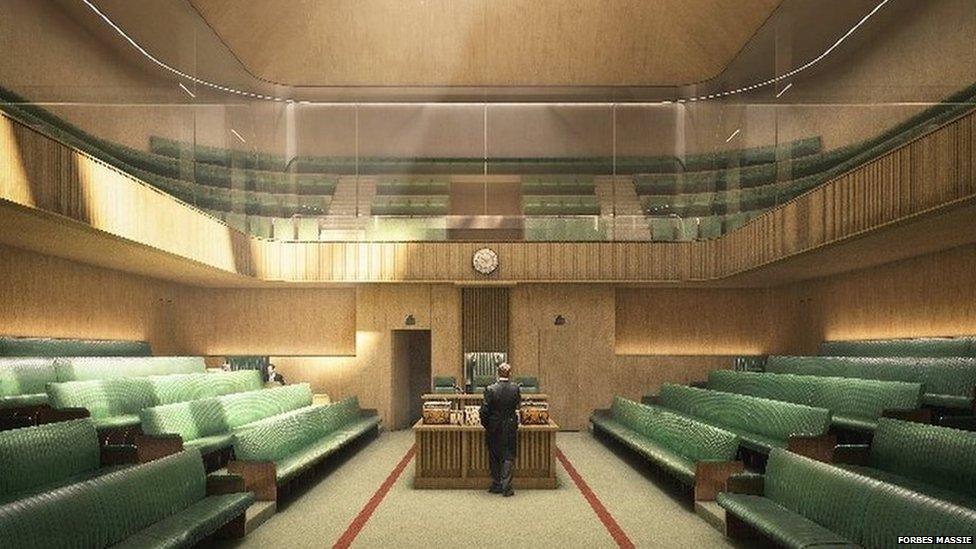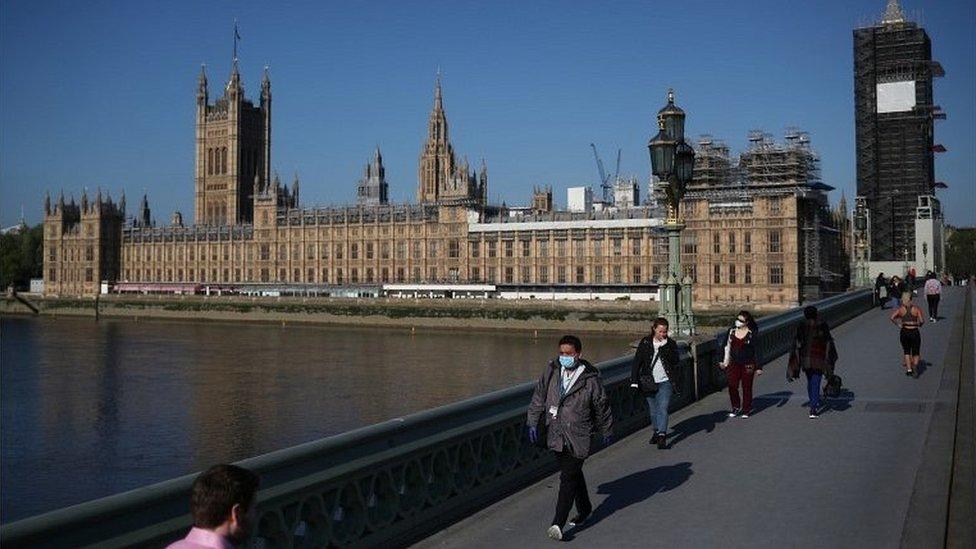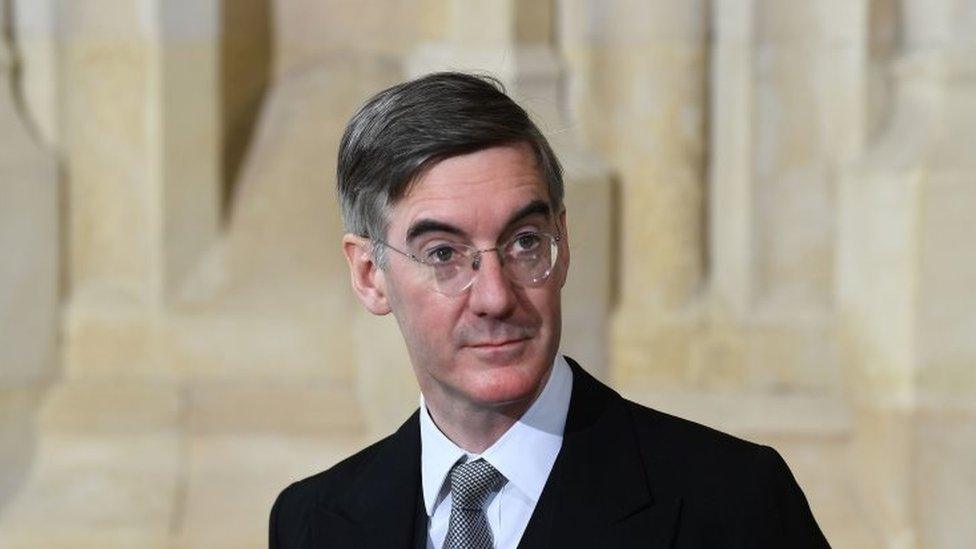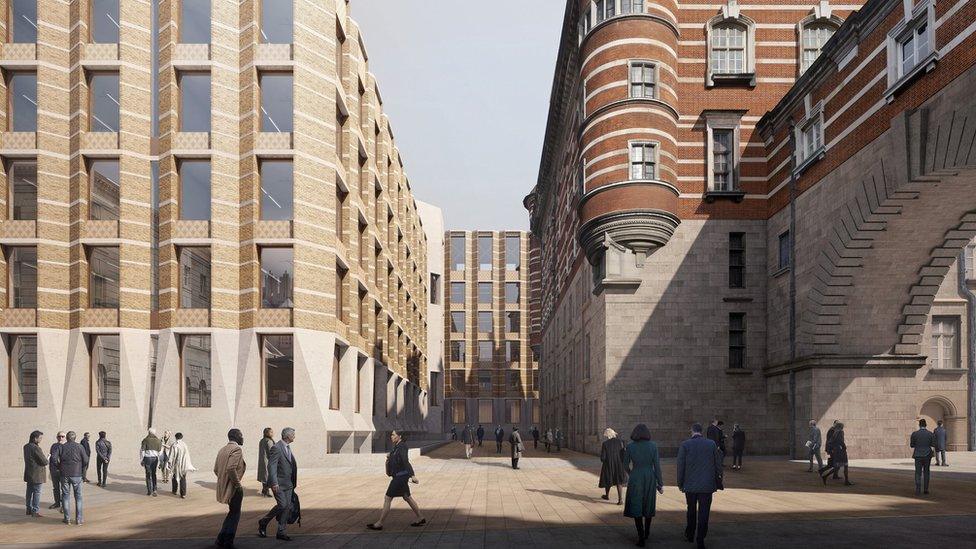Coronavirus: Will £4bn Parliament refurbishment be scrapped?
- Published
- comments

Architects' drawings of the replica Commons were released last year
MPs finally gave the go-ahead to refurbish the crumbling Palace of Westminster in 2019 after years of wrangling - but will it ever happen?
It is hard to imagine a worse look for MPs right now than spending more than £4bn on renovating their place of work.
Under current plans, they will move into a specially built replica of the House of Commons chamber, in nearby Richmond House, for six years or more while major repairs are carried out.
But these plans were drawn up long before the coronavirus pandemic threatened to tip the country into a deep recession.
And a review of the project, announced this week, will look at ways of cutting costs, including alternatives to the replica Commons.
There is speculation that some ministers, external are going cool on the idea of refurbishing Parliament at all, given the likely public backlash, and would prefer to carry on patching the building up.
A spokesman for Commons Leader Jacob Rees-Mogg told BBC News: "He is completely committed to safeguarding the Palace of Westminster for future generations.
"But it is clear there can be no blank cheque for this work."
There are fears in government that costs will get out of control once work starts, in the way that they have at Elizabeth Tower, which houses Big Ben.

Coronavirus has forced MPs to look again at the cost of refurbishment
It was always part of the plan for a detailed "business case", including budget options, to be drawn up for MPs before the Delivery Authority - modelled on the body that oversaw the 2012 Olympics - starts work on renovating Parliament.
The job has been handed to a panel of politicians and infrastructure experts, called the Sponsor Body, which has been urged to get a tighter grip on costs by the National Audit Office, amid fears the final bill will be far higher than £4bn.
But it is not just coronavirus that has prompted a deeper and more far-reaching examination of the costs than planned by Theresa May's government, which passed the legislation.
The Sponsor Body freely acknowledges that a change of prime minister and a new set of MPs, with different priorities, is a major factor too.
Boris Johnson has made much of his desire to boost the English regions, and as recently as January, ministers were floating the idea of permanently moving the House of Lords to York or Birmingham.
'Muddling through'
Labour MP Mark Tami, who sits on the board of the Sponsor Body, and is a weary veteran of the drawn-out debate about parliamentary restoration, fears the can is being "kicked down the road" once again.
"Just muddling through as we have done for the last 70 years is not an option, both in terms of cost and in terms of the health and safety, and wellbeing of everybody that works in Parliament.
"I haven't seen a viable alternative proposal to moving out from the people who are opposed to renewal and restoration. If they have one then we should look at it.
"We didn't get to this point where we are now, with the proposals we have, off the top of our heads."

Jacob Rees-Mogg is no fan of MPs working from home
The move-out plan, which would also see members of the House of Lords relocate to the QEII conference centre, opposite Westminster Abbey, was presented as the "best and most cost-effective" option in a report five years ago.
Forcing builders to work around the Commons schedule was seen as a more time-consuming, and costly, alternative.
The Sponsor Body will look at whether that is still the case.
Another board member, SNP MP Tommy Sheppard, is calling for virtual working, of the kind seen during the coronavirus outbreak, to help slash costs.
But that is unlikely to find favour with Mr Rees-Mogg, who is no fan of MPs working from home.
Conservative MP Sir Charles Walker, who sits on the House of Commons Commission with Mr Rees-Mogg and Speaker Sir Lindsay Hoyle, rejected the idea of moving proceedings online while the work is carried out.
"It isn't going to happen, of that I am certain. It isn't in the interests of Parliament."

What the outside of the replica Commons might look like
One thing everyone agrees on is that the Palace of Westminster is falling apart faster than it can be repaired.
All the fire, heating, drainage, mechanical and electrical systems need to be replaced, along with the sewage system, which was installed in 1888 - and the building needs to be stripped of asbestos.
The big fear is that if major repairs continue to be delayed, the 19th-Century building, a Unesco World Heritage site, will be destroyed by fire or flooding - or someone will be killed by falling masonry.
Doing nothing is also an expensive option.
According to the National Audit Office, Parliament has spent more than £369m on maintenance since 2016. There is an increasing backlog of repairs estimated at over £1bn.
Repairing Parliament is the last thing MPs want to be talking about in the midst of a national emergency.
Labour MP Alison McGovern told BBC Radio 4's Westminster Hour: "I find it bizarre that any MP is focused on our building, rather than what our constituents need at this moment."
But they will have to debate it, and make a decision on what to do, whether they like it or not, after the Sponsor Body reports back with its findings.